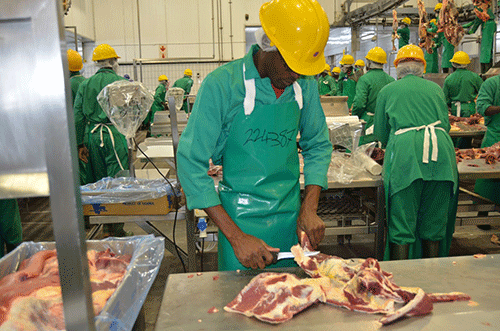The Livestock Producers’ Organisation (LPO) remains adamant that contract slaughtering at Meatco could significantly reduce operating costs at the State-owned enterprise, which would increase the sustainability of the business.
In a statement issued last week, the LPO noted it has been in continuous contact with all stakeholders and in October 2021 was the co-signatory, together with other representatives of primary producers, of the contract slaughter proposal for the sustainable future of Namibia’s beef value chain. According to LPO chairman, Thinus Pretorius, the proposal was also submitted to the ministries of public enterprises, agriculture as well as finance.
“The core principles were that Meatco should be transformed into a producer-controlled business, operating only on sound business principles and international best practices. The role of government should be at the policy level to create a supportive environment for the entire value chain to grow. Restoring the confidence of primary producers is a critical success factor, while a new board and management should be appointed to implement the above,” Pretorius stated.
The LPO chairman added that at the beginning of 2022, the organisation discussed a further proposal with the finance ministry to allow contract slaughtering by external Namibian meat marketers at the Meatco export abattoir.
“The LPO is of the opinion that this will contribute to the reduction of Meatco’s operating costs, and so may reduce the continued dependence of Meatco on taxpayers’ money. Contract slaughtering can be a win-win solution in that Meatco earns additional revenue for services rendered, while contractors interested in using the services, retain ownership of the vacuum-packed beef and export it to the market of their choice,” Pretorius continued.
The LPO statement further noted it is of utmost importance to realise that Meatco will have to undergo further drastic restructuring and internal cost cutting to avoid the government having to provide further loan guarantees, also calling attention to the fair distribution of the lucrative Norway quota between different export abattoirs which they said will also have to be addressed.
Said Pretorius: “The LPO unequivocally remains committed to continually optimise the industry by investing energy and resources to identify and support potential alternatives that could be of value to the industry.”
The LPO chairman further pointed out that since 2008, after Meatco settled its State loan of N$32.5 million, the LPO started engaging with industry role-players regarding a long-term and sustainable structure for Meatco in which all cattle producers could be involved.
From the onset, the LPO’s position was that Meatco is a critical pillar for optimal value addition. Over the last decade, the LPO, therefore, facilitated the process to nominate five directors who, in the process, exposed themselves significantly in terms of their accountability for good corporate governance and fiduciary duties, and who consequently also had to vacate their positions because of this exposure.
In 2018, the LPO launched a study in collaboration with partners to determine what the Namibian beef value chain looked like and how it compares to international benchmarks.
“This study clearly pointed out flaws at Meatco. A comprehensive report was shared with all stakeholders and agencies, including Meatco. During 2019, there were certain shifts in government and after the Public Enterprises Act (PEGA) came into force on 16 December 2019, Meatco was reclassified as an SOE under the Ministry of Public Enterprises,” Pretorius explained.


